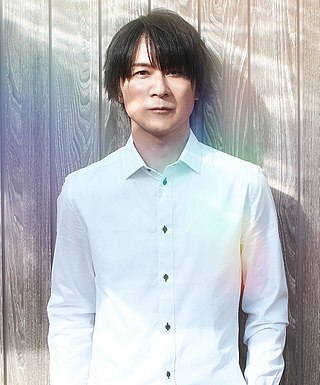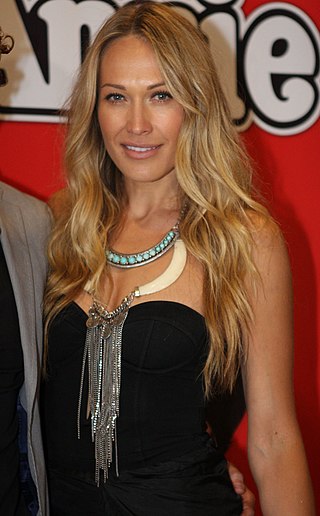
The Chemical Brothers are an English electronic music duo formed by Ed Simons and Tom Rowlands in Manchester in 1992. They were pioneers in bringing the big beat genre to the forefront of pop culture.

The Crystal Method is an American electronic music act formed in Las Vegas, Nevada, by Ken Jordan and Scott Kirkland in the early 1990s. They were pioneers of the big beat genre and their music has appeared in numerous TV shows, films, video games, and advertisements. Their 1997 debut studio album Vegas was certified platinum in 2007, and saw follow-ups Tweekend, Legion of Boom, Divided by Night, and The Crystal Method. In 2017, Ken Jordan retired from music and left the group, with Scott Kirkland adopting The Crystal Method as a solo moniker.

Hybrid is a British electronic music duo consisting of Mike and Charlotte Truman. The group was formed in 1995 by Mike Truman, Chris Healings, and Lee Mullin. At the time they were primarily known as a breakbeat collective, although they overlapped considerably with progressive house and trance.

Tom Holkenborg, also known as Junkie XL, is a Dutch composer, multi-instrumentalist, DJ, producer, and engineer. Originally known for his trance productions, he has moved to producing electronica and big beat music and film scores. His remix of Elvis Presley's "A Little Less Conversation" became a worldwide hit in 2002.

Claudia Brücken is a German singer and songwriter. She is the lead vocalist of the synth-pop band Propaganda.

The Chrono series is a video game franchise developed and published by Square Enix. It began in 1995 with the time travel role-playing video game Chrono Trigger, which spawned two continuations, Radical Dreamers and Chrono Cross. The music of Chrono Trigger was composed primarily by Yasunori Mitsuda, with a few tracks composed by regular Final Fantasy composer Nobuo Uematsu. The Chrono Trigger soundtrack has inspired four official album releases by Square Enix: a soundtrack album released by NTT Publishing in 1995 and re-released in 2004; a greatest hits album published by DigiCube in 1999, published in abbreviated form by Tokyopop in 2001, and republished by Square Enix in 2005; an acid jazz arrangement album published and republished by NTT Publishing in 1995 and 2004; and a 2008 orchestral arranged album by Square Enix. Corresponding with the Nintendo DS release of the game, a reissued soundtrack was released in 2009. An arranged album for Chrono Trigger and Chrono Cross, entitled To Far Away Times, was released in 2015 to commemorate the 20 year anniversary of Chrono Trigger.

Erika Heynatz is an Australian model, actress, singer, and television personality. She joined long-running Australian TV series Home and Away in June 2015, as villainous biology teacher Charlotte King.

L.A. Noire is a 2011 action-adventure video game developed by Team Bondi and published by Rockstar Games. Set in 1947 Los Angeles, the game follows detective Cole Phelps's rise among the ranks of the Los Angeles Police Department as he solves a range of cases across various bureaus. When he is tasked with investigating a morphine distribution ring involving several of his former squadmates from World War II, Phelps finds both his personal and professional life falling into turmoil, and reluctantly joins forces with his estranged former comrade, Jack Kelso, as they uncover a major conspiracy involving prominent Los Angeles figures.

Simon Hale is a British composer, arranger, and keyboardist.

Health is an American industrial/noise rock band from Los Angeles, California. The band currently consists of drummer B.J. Miller, vocalist and guitarist Jake Duzsik, and bassist and producer John Famiglietti. It formerly also included Jupiter Keyes, who left in 2015. Originating from the Los Angeles underground experimental music community, they gained prominence with a remix of "Crimewave" by Crystal Castles before releasing a self-titled album in 2007.
The Mother series is a role-playing video game series created by Shigesato Itoi for Nintendo. The series started in 1989 with the Japan-only release of Mother, which was followed up by Mother 2, released as EarthBound outside Japan, for the Super NES in 1994. A second sequel was released in Japan only, Mother 3, for the Game Boy Advance in 2006. The music of the Mother series includes the soundtracks to all three games; the first game was composed for by Keiichi Suzuki and Hirokazu Tanaka, who were joined by Hiroshi Kanazu for the second game, while Mother 3's score was written by Shogo Sakai.
The music for the 2010 action-adventure western video game Red Dead Redemption, developed by Rockstar San Diego and published by Rockstar Games, was composed by musicians Bill Elm and Woody Jackson. Recorded at Jackson's studio in Los Angeles, the soundtracks were produced by David Holmes. The music was intended to imitate soundtracks of 1960s Western films, such as Ennio Morricone's work on the Dollars Trilogy. In collaboration with each other, Elm and Jackson produced over fourteen hours of music across fifteen months. The composers used unconventional instruments to create unique sounds, and worked with artists such as Tommy Morgan during production. Four supplementary vocal recordings were also produced for the game.
The music for the 2013 action-adventure video game Grand Theft Auto V, developed by Rockstar North and published by Rockstar Games, was composed by German electronic music group Tangerine Dream, American composer Woody Jackson, and American hip hop musicians The Alchemist and Oh No. The game is the first entry in the Grand Theft Auto series to make use of an original score. In collaboration with each other, the musicians produced over twenty hours of music which scores the game's missions. Some of the works produced by the musicians throughout the game's development influenced some of the in-game missions and sparked inspiration for further score development. Grand Theft Auto V has an in-game radio that can tune into sixteen stations playing more than 441 tracks of licensed music, as well as two talk radio stations. The composers of the score wanted it to accompany the licensed music, as opposed to detract from it.
L.A. Noire, a neo-noir detective video game developed by Team Bondi, focuses on police detective Cole Phelps and his partners as they investigate and solve various crimes. Previously a U.S. Marine Lieutenant in the second World War, Phelps's experiences during the war left him scarred, and inspired him to join the Los Angeles Police Department.
The music of the 1998 role-playing video game Parasite Eve, based on the novel of the same name by Hideaki Sena, was composed by Yoko Shimomura, and was one of her early popular successes. The music for its 1999 sequel Parasite Eve II was composed by Naoshi Mizuta and arranged by Hiroshi Nakajima. The 2010 spin-off title The 3rd Birthday was composed for by Shimomura, Mitsuto Suzuki and Tsuyoshi Sekito. Shimomura's work was described by herself as experimental, and incorporated multiple musical genres including opera music. The score for Parasite Eve was recorded at the Andora Studios in Los Angeles. For Parasite Eve II, Mizuta spent a year and a half on the project, using the game's scenario and visuals as references and taking inspiration from multiple film genres. It was Mizuta's first project after transferring from Capcom to Square Enix. For The 3rd Birthday, Shimomura worked with Suzuki and Sekito to create a score reminiscent of Parasite Eve, while Japanese rock band Superfly provided the theme song "Eyes on Me".
The Metal Gear video games consist of 17 different albums, totaling over 940 hours of music within the 11 games. There were four different music labels used for the albums in different games. These include Sony Entertainment, Konami Digital Entertainment, Phantom Studios, Sumthing Else Music Works, and King Records (Japan). The most used record labels were Konami Digital Entertainment and King Records. Konami was used for Metal Gear 20th Anniversary: Metal Gear Music Collection, Metal Gear Solid 4: Guns of the Patriots Original Soundtrack, Metal Gear Solid: Peace Walker Original Soundtrack, and the Metal Gear 25th Anniversary: Metal Gear Music Collection, Metal Gear Rising: Revengeance. King Records was used for Metal Gear 2: Solid Snake Original Soundtrack, Metal Gear Solid Original Game Soundtrack, Metal Gear/ Solid Snake: Music Compilation of Hideo Kojima / Red Dis, Metal Gear Solid 2: Sons of Liberty Original Soundtrack, and Metal Gear Solid 2: Sons of Liberty Soundtrack 2: The Other Side. Several different producers were used for different games. These include Konami, Masahiro Hinami, Noriakio Kamura, Norihiko Hibino, Tojima, Harry Gregson-Williams. Konami producing 6 out of the 11 Metal Gear games. The games used many different genres of music throughout the games. They are as follows: breakbeat, classical, drum and bass, electronic, hip hop, jazz, ambient, acoustic, Latin American, electronic rock, industrial metal, alternative metal, hard rock, power metal, neoclassical, romantic music, lounge, and rock and roll.

Woodrow Wilson Jackson III is an American composer and session musician. He is best known for his work with Rockstar Games, composing scores for its video games Red Dead Redemption, L.A. Noire, Grand Theft Auto V, and Red Dead Redemption 2. Born in Oil City, Pennsylvania, Jackson studied at Virginia State University for one year, taking harmonica lessons before dropping out and playing guitar in a band. He moved to Los Angeles in 1992, and eventually joined the band Friends of Dean Martinez. He later became a session musician, working on the soundtracks of films like Ocean's Twelve (2004) and The Devil Wears Prada (2006). Since 2009, he has owned and operated Electro-Vox Recording Studios in Hollywood, where he has recorded two original albums and much of his composing work. He is an avid collector of vintage instruments.
The music for the 2018 action-adventure game Red Dead Redemption 2, developed and published by Rockstar Games, consists of an original score composed by musician Woody Jackson and an original soundtrack produced by Daniel Lanois. The soundtrack album was released digitally in July 2019, consisting of vocal tracks with artists such as Willie Nelson, Rhiannon Giddens, and Josh Homme. The score album was released in August 2019, mostly consisting of Jackson's original work and collaborations with artists such as Colin Stetson, Senyawa, and Arca. An additional extended play, The Housebuilding EP, was released in February 2021, consisting of original songs by David Ferguson and Matt Sweeney. Two singles of music from the game have also been released: "Unshaken" by D'Angelo in January 2019, later released as part of the original soundtrack; and "Letter from Bluewater Man" by Christone "Kingfish" Ingram in August 2021, as part of an update for Red Dead Online.

Sonic the Hedgehog is a Japanese video game series and media franchise created and owned by Sega. The franchise began in 1991 with Sonic the Hedgehog, a side-scrolling platform game, and has expanded to include printed media, animations, feature films, and merchandise. The music of Sonic the Hedgehog has been provided by a number of composers, ranging from Sega sound staff to independent contractors and popular bands. It covers a wide array of genres, including pop, funk, rock, metal, ska, punk, hip hop, R&B, jazz, electronica, dance, breakbeat, drum and bass, techno, ambient, orchestral, and lo-fi.
The music of the Dead Space media franchise, created by Visceral Games and published by Electronic Arts around a series of survival horror video games, was mainly composed by Jason Graves. Graves composed the music for all mainline entries in the series and the majority of spin-off titles. Other composers have been involved in the series; Grave's recurring collaborator Rod Abernethy acted as an early advisor for the titular first game, James Hannigan co-composed the score for Dead Space 3, while the 2023 remake of the first game combined original music with contributions by Trevor Gureckis. Scores for the movies Dead Space: Downfall and Dead Space: Aftermath were respectively composed were Seth Podowitz and Christopher Tin.















